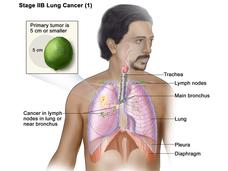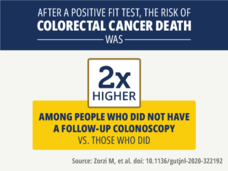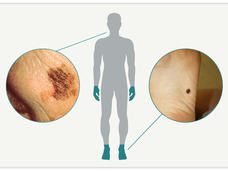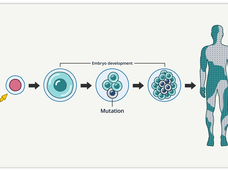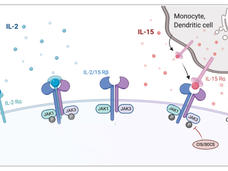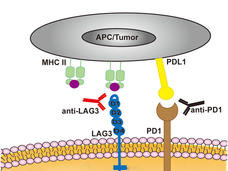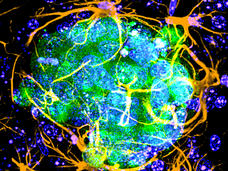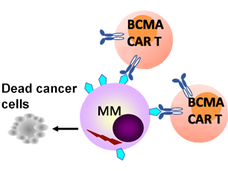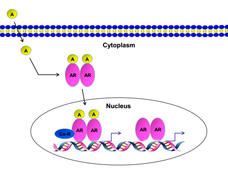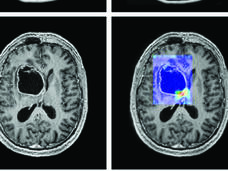Cancer Currents: An NCI Cancer Research Blog
A blog featuring news and research updates from the National Cancer Institute. Learn more about Cancer Currents.
-
For Early-Stage Lung Cancer, Nivolumab and Chemo before Surgery Proves Effective
Giving people with early-stage lung cancer the immunotherapy drug nivolumab (Opdivo) and chemotherapy before surgery can substantially delay the progression or return of their cancer, a large clinical trial found.
-
Working to Close the Cancer Screening Gap Caused by COVID
Many hospitals and community health centers are trying to increase cancer screening rates after the COVID pandemic caused them to plummet. The largest effort aims to add a total of 70,000 additional monthly screening tests over a 6-month period.
-
Ivosidenib with Chemotherapy New Option for Some People with AML
For some people with acute myeloid leukemia (AML) that has a mutation in the IDH1 gene, combining ivosidenib (Tibsovo) with the chemotherapy drug azacitidine may be a new treatment option, according to results from a large clinical trial.
-
Colonoscopy after Positive FIT Test Cuts Risk of Colorectal Cancer Death
People who had a positive FIT result (signs of blood in the stool) but didn’t get a follow-up colonoscopy were twice as likely to die of colorectal cancer as those who did get a colonoscopy, a new study found.
-
Study Adds to Debate about Screening for Melanoma
Regular skin cancer screening leads to many diagnoses of very early-stage melanomas, results from a new study suggest. The results add to a debate about whether screening is fueling an overdiagnosis of melanoma in the United States.
-
Body Location May Influence Fate of Cells with Cancer-Causing Mutations
Whether cells with cancer-related genetic changes will develop into tumors may partly depend on their location in the body, a new study finds. The study focused on a rare form of skin cancer, acral melanoma.
-
Embryos in the Womb Can Get Gene Mutations That Lead to Cancer in Adulthood
Mutations in cancer-related genes that start in embryos may be more common than once thought, a new study has shown. Finding out if a person has a mosaic mutation is important for their cancer care, according to the study leaders.
-
Screening for Many Cancers with One Test: Uncertainty Abounds
Progress has been made on developing noninvasive tests that may be able to find many cancers early. But, as NCI’s Dr. Phil Castle explains, there’s still much to learn about these multi-cancer early detection tests before they become widely used.
-
Identifying Safer Ways to Look for Recurrence after Testicular Cancer Surgery
After surgery for early-stage, low-risk testicular cancer, it’s safe to monitor for a recurrence using MRI scans or fewer CT scans than are currently used, according to results from a large clinical trial.
-
Implanted “Drug Factories” Deliver Cancer Treatment Directly to Tumors
Researchers have developed tiny “drug factories” that produce an immune-boosting molecule and can be implanted near tumors. The pinhead-sized beads eliminated tumors in mice with ovarian and colorectal cancer and will soon be tested in human studies.
-
Opdualag Becomes First FDA-Approved Immunotherapy to Target LAG-3
The immunotherapy treatment, which combines the LAG-3 inhibitor relatlimab and PD-1 inhibitor nivolumab, becomes the first new immune checkpoint inhibitor approved in 8 years. Both drugs are given to patients via a single infusion to treat advanced melanoma.
-
Alzheimer’s-Linked Protein May Help Melanoma Spread to Brain
Melanoma cells that travel to the brain produce their own amyloid beta, helping the cells survive and form metastases, a new study in mice shows. The Alzheimer’s-linked proteins appear to tamp down the brain’s immune response to the cancer cells.
-
Carvykti Approval Marks Second CAR T-Cell Therapy for Multiple Myeloma
People with advanced multiple myeloma now have another option for CAR T-cell therapy with the recent approval of ciltacabtagene autoleucel (Carvykti). Like the first approved CAR T-cell therapy, Carvykti targets the BCMA protein on myeloma cells.
-
Darolutamide Extends Survival for Some People with Metastatic Prostate Cancer
Adding darolutamide (Nubeqa) to ADT and docetaxel (Taxotere) can improve how long men with hormone-sensitive metastatic prostate cancer live without causing more side effects, results from the ARASENS trial show.
-
Can Artificial Intelligence Help See Cancer in New, and Better, Ways?
Researchers have been developing artificial intelligence (AI) tools that could make cancer imaging faster, more accurate, and more informative. But there are also questions about whether these tools are ready for doctors’ offices, whether they will actually help people, and whether that benefit will reach all—or only some—patients.
-
Severe Side Effects of Cancer Treatment Are More Common in Women than Men
Women are more likely than men to experience severe side effects from cancer treatments such as chemotherapy, targeted therapy, and immunotherapy, a new study finds. Researchers hope the findings will increase awareness of the problem and help guide patient care.
-
Trametinib Is a New Treatment Option for Rare Form of Ovarian Cancer
New results from a large study show that trametinib (Mekinist) is an effective treatment for low-grade serous ovarian cancer. The findings are the first strong evidence that this rare type of ovarian cancer should be treated differently from other forms of the disease.
-
Telehealth-Based Cancer Care Surged during COVID. Will It Continue?
Experts say studies are needed on how to best transition telehealth from a temporary solution during the pandemic to a permanent part of cancer care that’s accessible to all who need it.
-
Good News and Cautions about Pregnancy for Childhood Cancer Survivors
As adults, survivors of childhood cancer aren’t any less likely to have healthy babies than those without a history of cancer, a new study shows. However, they may have more health risks during pregnancy, warranting more intensive obstetric care.
-
Experimental Medulloblastoma Treatment Gets a Boost with Nanoparticles
A nanoparticle coating may help cancer drugs reach medulloblastoma tumors in the brain and make the treatment less toxic. Mice treated with nanoparticles containing palbociclib (Ibrance) and sapanisertib lived substantially longer than those treated with either drug alone.

